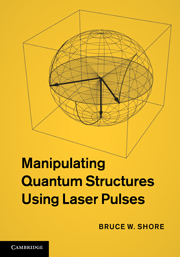Book contents
- Frontmatter
- Contents
- Preface
- Acknowledgments
- 1 Introduction
- 2 Atoms as structured particles
- 3 Radiation
- 4 The laser–atom interaction
- 5 Picturing quantum structure and changes
- 6 Incoherence: Rate equations
- 7 Coherence: The Schrödinger equation
- 8 Two-state coherent excitation
- 9 Weak pulse: Perturbation theory
- 10 The vector model
- 11 Sequential pulses
- 12 Degeneracy
- 13 Three states
- 14 Raman processes
- 15 Multilevel excitation
- 16 Averages and the statistical matrix (density matrix)
- 17 Systems with parts
- 18 Preparing superpositions
- 19 Measuring superpositions
- 20 Overall phase; interferometry and cyclic dynamics
- 21 Atoms affecting fields
- 22 Atoms in cavities
- 23 Control and optimization
- Appendix A Angular momentum
- Appendix B The multipole interaction
- Appendix C Classical radiation
- Appendix D Quantized radiation
- Appendix E Adiabatic states
- Appendix F Dark states; the Morris–Shore transformation
- Appendix G Near-periodic excitation; Floquet theory
- Appendix H Transitions; spectroscopic parameters
- References
- Index
- Frontmatter
- Contents
- Preface
- Acknowledgments
- 1 Introduction
- 2 Atoms as structured particles
- 3 Radiation
- 4 The laser–atom interaction
- 5 Picturing quantum structure and changes
- 6 Incoherence: Rate equations
- 7 Coherence: The Schrödinger equation
- 8 Two-state coherent excitation
- 9 Weak pulse: Perturbation theory
- 10 The vector model
- 11 Sequential pulses
- 12 Degeneracy
- 13 Three states
- 14 Raman processes
- 15 Multilevel excitation
- 16 Averages and the statistical matrix (density matrix)
- 17 Systems with parts
- 18 Preparing superpositions
- 19 Measuring superpositions
- 20 Overall phase; interferometry and cyclic dynamics
- 21 Atoms affecting fields
- 22 Atoms in cavities
- 23 Control and optimization
- Appendix A Angular momentum
- Appendix B The multipole interaction
- Appendix C Classical radiation
- Appendix D Quantized radiation
- Appendix E Adiabatic states
- Appendix F Dark states; the Morris–Shore transformation
- Appendix G Near-periodic excitation; Floquet theory
- Appendix H Transitions; spectroscopic parameters
- References
- Index
Summary
The discrete energies En of bound states are not the only indicators of quantum-mechanical properties and quantization. Rotational motion of atoms or molecules, associated with angular momentum, is also quantized, both in magnitude and in direction; only discrete orientations are allowed with respect to any selected (but arbitrary) axis of quantization [Sho90, §18.1]. In the absence of external fields, the energy of a free atom or molecule does not depend on this orientation, and the energy states are degenerate. This chapter discusses that degeneracy, and the theory of coherent excitation of such degenerate quantum states.
Angular momentum degeneracy. The theoretical building blocks for describing rotational motion are angular momentum states |J,M,〉 discussed in App.A, associated with a dimensionless vector operator Ĵ and its component Ĵz along a quantization axis, taken as defining the z axis. The label J, the angular momentum quantum number, derives from the eigenvalue J(J + 1) of the operator Ĵ2 and therefore quantifies the magnitude of the angular momentum. It may be an integer or half integer. The label M, the magnetic quantum number, is the eigenvalue of Ĵz; it quantifies the projection of angular momentum along a reference axis. The values of M differ by integers and range from −J to +J in integer steps. The total number of such values, 2J +1, is an integer, the degeneracy of the quantum state |J,M〉.
Angular momentum of an isolated quantum system, such as an atom or molecule, refers always to the center of mass (which may be moving).
Information
- Type
- Chapter
- Information
- Manipulating Quantum Structures Using Laser Pulses , pp. 171 - 185Publisher: Cambridge University PressPrint publication year: 2011
